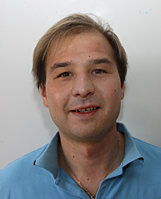More effective anti-retroviral drugs for HIV-infected
Improved retroviral drugs, new super-efficient cleansing agent and new plastics. This could be the result of a KTH student’s research developments.

“Researchers have been looking for an explanation to this phenomenon for 50 years.”
This is how student, Per-Olof Syrén describes the work he has been doing during the past four years.
It is about enzyme design and research on enzymes. Both the work and the results are astounding, especially since the enzyme is composed of not less than 6,000 atoms, which takes time to study.
“What I’ve found is an interaction between two atoms in proteases, which is a group of enzymes. The interaction explains why proteases are active against peptides. Researchers have missed this interaction earlier, so the discovery is important,” says Per-Olof Syrén.
This interaction in particular is in HIV protease, a protein needed for the spread of the virus. That is why Per-Olof Syrén’s discovery has lead to a new way thinking as to how new and effective anti-retroviral drugs for HIV-infected should be designed.
“A new drug that prevents this interaction is one possible scenario,” says Per-Olof Syrén.
But there are also other possible future areas of use for the research results.
“For example, a detergent that is super efficient, new materials such as new plastics that can be used for clothing, or to encapsulate drugs. Even materials for surface treatment - such as a new form of plastic film on a wooden table, are conceivable. Such materials could be a good replacement for the impregnation of wood which is not environmentally friendly,” says Per-Olof Syrén.
He also adds that there is a considerable need in the business community and industry for enzymes that can be used for the production of fine chemicals and new materials. This is what is referred to as green chemistry. Per-Olof Syrén adds that his mentor Karl Hult, Professor of Biochemistry at KTH, has also been highly involved in the research.
For more information, contact Per-Olof Syrén on 070 - 340 49 90 or per-olof.syren@biotech.kth.se.
Peter Larsson

